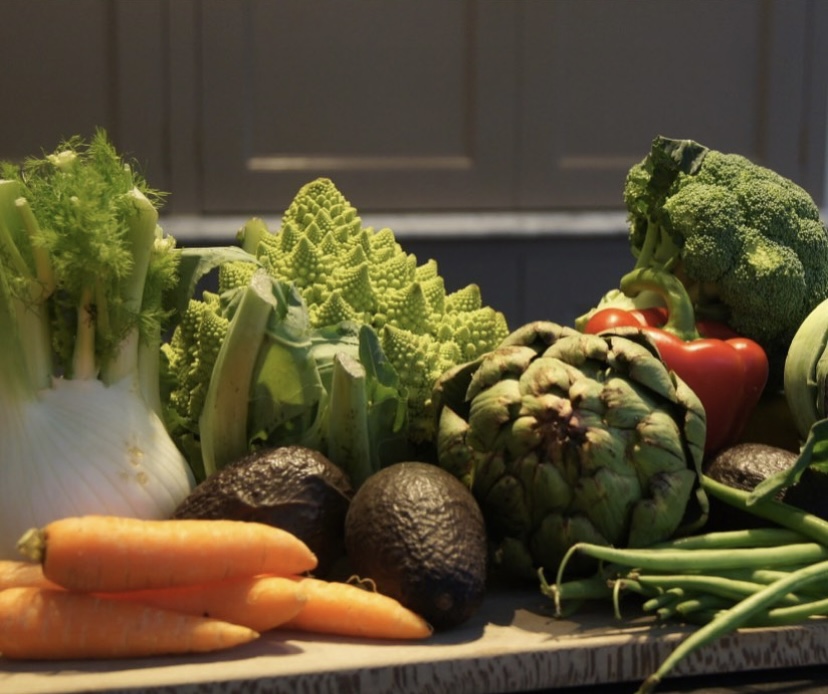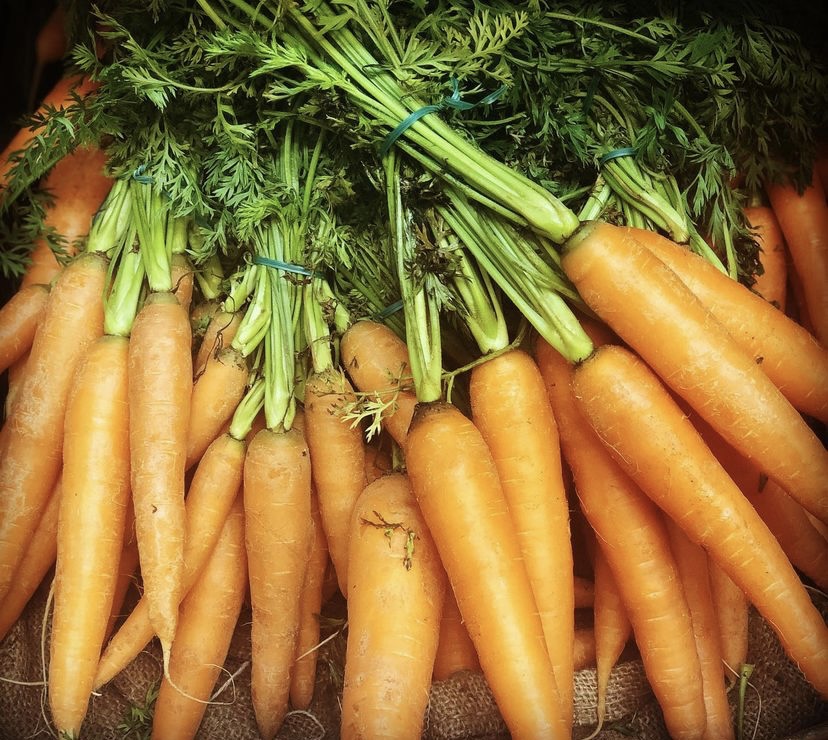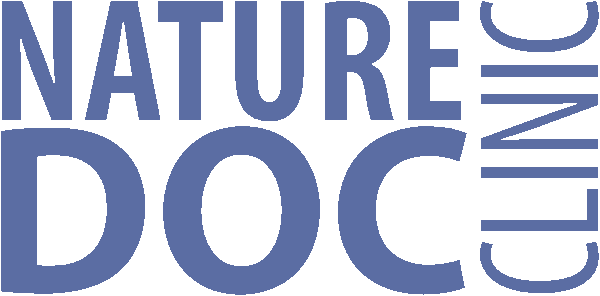The Nutrition Corner

An enormous part of our health and wellbeing is what and how we eat. We all need food, whether we’re self confessed ‘foodies’ or we prefer to eat for sustenance or we’re more in the ‘don’t think, just eat’ camp. We all have a relationship with food, it is a necessary part of our life, we eat to live.
There’s so much information out there so I’ve brought in experienced nutritionist, Caroline Davies to offer sound nutrition advice as well as offer recipe ideas. Here’s what she thinks…
Plant Based Eating
If you are a long-term vegan or just taking part in Veganuary, a vegan diet benefits from a little knowledge 🤓 and planning to ensure it is a healthy choice and will provide you with all of your required nutrients.
Here are my tips:
✋Go slowly and make small changes. You can always start with a few days a week, or 1-2 meals a day. Your body and digestion may need to get used to the increased fibre from a plant-based diet too.
🍽 Build a balanced plate made up of protein (beans, pulses, nuts, seeds), carbohydrates (vegetables, whole grains, fruit) and healthy fats (nuts, seeds, avocado, oils, olives).
🌈 Eat the rainbow: Different coloured fruit and veg contain different vitamins, minerals and phytonutrients so variety is key. Aim for 5+ portions of vegetables and 2 portions of fruit daily.
💪🏻 Protein: Whereas animal products contain the full spectrum of essential amino acids, plant sources generally do not. We need all of them to function, so ensure a variety, eg rice and beans.
🍔 Processed vegan foods eg burgers, snacks, are no healthier than their non-vegan counterparts, and will often be higher in salt, fat and sugar. Read the label!
🥛Consider fortified foods eg plant milks, to replace the nutrients you would get from animal equivalents.
💊Supplements: Vegans may need supplements to replace nutrients lacking in a plant-only diet. In particular B12, iron, vitamin D and omega-3 essential fatty acids are often needed. But consult a nutritional professional for specific and personalised advice, as we all have different requirements.
🍖 Consider ‘meat as a condiment’: Whilst I am a huge fan of plant-based eating it is not for everyone. Some people might benefit and enjoy small amounts of good quality meat and fish in their diet.
✋🏻Disclosure – I am not a vegan! But I regularly see clients who are, and generally benefit from tailored nutrition advice and support.
Do I need to Detox

There is little to no scientific evidence showing any benefits of ‘detox programmes’. Our amazing bodies are natural detoxification machines ⚙️. That is what the liver, kidneys, lungs 🫁 , lymphatic system, skin and bowels💩 do 365 days a year, not just in January!
We gravitate towards ‘quick fixes’ as it actually takes hard work and commitment to be ‘healthy’.
➡️ However, we can definitely support our body’s detoxification processes through optimising diet and lifestyle including:
🥑🐟choosing whole foods in their natural state whilst reducing processed food
🍷reducing toxins such as alcohol and tobacco 🚬
🏃♂️regular exercise
☀️exposure to daylight
💤sufficient good-quality sleep
💦sufficient water to hydrate
➡️ Most short term ‘detoxes’ are glorified starvation diets. They involve restricting calories and consuming lots of liquids. You will lose weight because you are starving yourself, but the result will most likely be temporary, from water loss in your muscles.
➡️ ‘Getting healthy’ involves making, and keeping, realistic and sustainable changes that are personal to you. Integrating them slowly so they become part of your regular lifestyle.
☎️ If you need some help with this please get in touch – I offer a complimentary phone call so you can find out if I am the right nutritionist to help you.
Vitamin D - The Sunshine Vitamin

Vitamin D – The Sunshine ☀️ Vitamin
I feel like everyone should know about vitamin D as it makes the news on such a regular basis. In clinic it is one of vitamins I assess and test for as I still regularly see clients who are deficient in it. According to the NHS 1 in 5 adults have low levels.
Vitamin D deficiency is associated with compromised immune function and new studies are suggesting vitamin D supplementation as a preventative measure to reduce the severity of outcome associated with Covid-19. Vitamin D deficiency is also more common in older adults, people who are overweight, and those of black, Asian and ethnic minority origin – all of the groups who are at increased risk of becoming very ill with Covid.
More research is needed but in the meantime we should all try to increase our intake of vitamin D. There are few foods that naturally contain adequate vitamin D – oily fish, mushrooms and egg yolks, but only in small amounts. So supplementation is recommended by Public Health England over the winter months in the UK when limited exposure to sunlight reduces our ability to naturally synthesise it through the skin.
Note that although vitamin D supplements are very safe, taking more than the recommended amount every day can be dangerous in the long run, so ideally get your levels tested and / or consult your health practitioner.
Supplements
💊Do you take nutritional supplements? If so read on for things to consider ⏬
❓Do they contain unnecessary excipients (additional ingredients unrelated to the individual nutrients) like fillers/bulking agents, flavours, gelling agents, colours…
❓Capsules or tablets? Powder or liquid?
❓When should you take your supplement? On an empty stomach? With food? Before food? Away from specific foods? Away from medication? In the morning? At night?
❓Is it worth paying for a more expensive brand?
❓What form is the individual nutrient in eg Methylated or non methylated? Vitamin D2 or D3? Activated? Food form? Food state? Liposomal?
➡️Some like magnesium come in a bewildering number of forms – citrate, bisglycinate, sulphate, oxide, chloride… all with different therapeutic applications
➡️Some will be better absorbed eg iron bisglycinate vs iron sulphate so you can take a smaller dosage
➡️Some supplements like iron, can be inflammatory in excess / if you don’t need them
➡️Supplements may give you unwanted side effects eg nausea, bloating, constipation…
⚠️Lastly but most importantly – DRUG NUTRIENT INTERACTIONS – just because a supplement is natural does NOT mean it is safe to take with medication
⚠️ As a Registered Nutritional Therapist I have been trained in this, and will check all drug/nutrient interactions before making recommendations
⚠️Statins, warfarin and SSRIs are just a few of the common ones that interact with some supplements
🚫 No one should be on a supplement for life (unless medically required) so if you have been taking something for years maybe it’s time to ask yourself:
❓Why are you taking it❓Do you still need it❓
Breakfast...should I eat or not?

“Should I eat breakfast?” I was recently asked.
We are all led to believe that breakfast is the most important meal of the day.
However a lot of the previous research behind the idea of ‘going to work on an egg’ 🍳 has been discredited.
By delaying your first meal of the day you are are extending the ‘fasted state’, aka Time Restricted Eating (TRE).
🍽TRE refers to a daily ‘eating window’, and can be as simple as ’12:12’, a 12hr eating window, or lengthen the overnight fast with a later breakfast as much as ’16:8’ ie 8hr eating window, 16hrs food-free.
The extended food free window allows your gut to repair and regenerate.
💃Women in particular need to be careful as any more than this can affect hormonal balance.
➡️Research suggests benefits to metabolic health and longevity
➡️Anecdotally people often report feeling more focused and have more energy
➡️Limiting your eating window may lead to weight loss too.
Experiment.👂Listen to your body and pay attention to your hunger cues. What works for you? If you are not hungry (and healthy, 🚫not pregnant, diabetic, etc) then it is fine to wait until later.
Personally I love breakfast, but I do 14hrs some days by pushing breakfast back to 9/10am and having an early supper.
But breakfast really is OPTIONAL.
How to get the most out of your fruit and veg!
Pomegranate Seeds

Pomegranate seeds are rich in fibre and packed with nutrients such as Vitamins C and K, some B vitamins and minerals such as potassium and calcium. However, it is their two powerful antioxidants – punicalagins and punicic acid – which are responsible for giving pomegranates their potent antiviral and antibacterial benefits.
They do contain quite a bit of naturally occurring fruit sugars, so I tend to avoid the juice and use the seeds in salads like this Freekeh and Chickpea Salad with Pumpkin & Pomegranate Seeds.
This is one of my go-to-salads that I will often make early on in the week and it will see us through a few lunches especially as Mr D is currently WFH too, so some pre-prepared lunches are vital. The key ingredient taste-wise for me is the pomegranate molasses – definitely worth investing in and it keeps for ages in the fridge.
I’ll eat it with some rocket and avocado. Full of fibre, protein and healthy fats. Delicious 😋
Ingredients:
500g wholegrain freekeh 1 bunch flat leaf parsley, chopped
1 bunch fresh mint, chopped
1 bunch fresh dill, chopped
400g can chickpeas, rinsed and drained 1 tsp mild smoked paprika
Seeds of 1 pomegranate (or a 200g pot)
Handful of pumpkin seeds .
Dressing
1 tbsp pomegranate molasses 1 tbsp apple cider vinegar Juice of 1 lemon 6 tbsp extra virgin olive oil Sea salt and freshly ground pepper to taste
.
Method:
- Cook the freekeh as per instructions (usually 20-30 minutes)
- Drain and refresh under cold water
- Add the chickpeas to the pan and toss with 1 tsp mild smoked paprika for a few minutes
- In a large bowl combine the freekeh, chick peas, chopped herbs, pumpkin seeds, pomegranate seeds and almonds
- In a small bowl add the ingredients for the dressing and whisk together.
- Add the dressing to the salad and mix.
Carrots

👀 Everyone grows up knowing carrots help us see in the dark.
Why? 👁 Vitamin A is linked to improved eye health and may reduce your risk of age-related macular degeneration. And carrots are a great source of the carotenoid BETA CAROTENE that our body converts into Vitamin A.
I give the kids raw carrots before lunch / supper when they are so hungry they will eat almost anything 😉 although absorption of beta carotene is actually 6-7 times better from cooked carrots.
Combining with a fat source will also increase absorption of beta carotene (vit A is a fat soluble vitamin) eg eating them with nuts or humous, cooked with a drizzle of olive oil.
🤓 Other phytonutrients in carrots include alpha-carotene, lutein, lycopene, anthocyanin… which all do varying jobs within the body, but all under the antioxidant umbrella, ie helping protect the body against free radical damage.
Carrots are also:
🥕A great source of B vitamins (particularly biotin and B6), potassium and vitamin K1
🥕A good source of fibre – approx 2g in a medium carrot – we should be aiming for 30g fibre/day
🥕Low glycemic load – ie digested and absorbed more slowly so do not spike blood sugar after eating, so are fine if you are diabetic too.
➡️I made carrot top pesto (you can actually make pesto from any green leaves) by blitzing:
⭐️Carrot tops
⭐️⅓ cup pine nuts
⭐️2 garlic cloves
⭐️½ cup extra virgin olive oil
Add in
⭐️½ cup grated parmesan cheese
⭐️Season with sea salt and black pepper
🍽 We had it on top of salmon fillets and mixed in to wholegrain pasta, with a generous portion of steamed broccoli 🥦 & carrots 🥕 (naturally!) on the side.
But would work equally well with any other fish, meat, as a dip etc.
